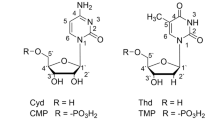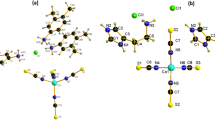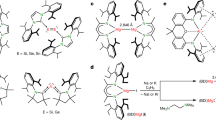Abstract
WE wish to present evidence for the formation of two types of cobalt complexes of proteins and polypeptides in which cobalt is probably bound to the peptide groups. A variety of proteins (for example, gelatin, pepsin, edestin, lysozyme, chymotrypsinogen), as well as tetraglycine and poly-DL-alanine, give the complexes, but most of the work has been carried out with commercial gelatin.
This is a preview of subscription content, access via your institution
Access options
Subscribe to this journal
Receive 51 print issues and online access
$199.00 per year
only $3.90 per issue
Buy this article
- Purchase on Springer Link
- Instant access to full article PDF
Prices may be subject to local taxes which are calculated during checkout
Similar content being viewed by others
References
Martin, R. B., Chamberlin, M., and Edsall, J. T., J. Amer. Chem.Soc., 82, 495 (1960).
Manyak, A. R., Murphy, C. B., and Martell, A. E., Arch. Biochem. Biophys., 59, 373 (1955).
Bello, J., and Vinograd, J. R., Nature, 181, 273 (1958).
Author information
Authors and Affiliations
Rights and permissions
About this article
Cite this article
BELLO, J., BELLO, H. Cobalt Complexes of Proteins and Polypeptides. Nature 192, 1184–1185 (1961). https://doi.org/10.1038/1921184a0
Issue Date:
DOI: https://doi.org/10.1038/1921184a0
This article is cited by
-
Einflu\ einiger reiner Metalle und Legierungen auf das Wachstum von Kaninchenfibrocyten in Gewebekulturen
Zeitschrift für Die Gesamte Experimentelle Medizin einschließlich experimentelle Chirurgie (1967)
-
Cobalt Complexes of Polyglycines
Nature (1963)
Comments
By submitting a comment you agree to abide by our Terms and Community Guidelines. If you find something abusive or that does not comply with our terms or guidelines please flag it as inappropriate.



